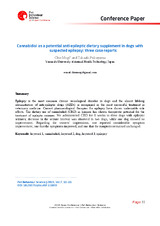Mostrar el registro sencillo del ítem
Cannabidiol as a potential anti-epileptic dietary supplement in dogs with suspected epilepsy: three case reports
| dc.contributor.author | Mogi, Chie | |
| dc.contributor.author | Fukuyama, Takaaki | |
| dc.date.accessioned | 2019-05-13T12:03:19Z | |
| dc.date.available | 2019-05-13T12:03:19Z | |
| dc.date.issued | 2019 | |
| dc.identifier.issn | 2445-2874 | |
| dc.identifier.uri | http://hdl.handle.net/10396/18547 | |
| dc.description.abstract | Epilepsy is the most common chronic neurological disorder in dogs and the almost lifelong administration of anti-epileptic drugs (AEDs) is recognized as the most successful treatment in veterinary medicine. Current pharmacological therapies for epilepsy have shown undesirable side effects. The dietary use of cannabidiol (CBD) in humans has shown therapeutic potential for the treatment of epileptic seizures. We administered CBD for 8 weeks to three dogs with epileptic seizures; decrease in the seizure interval was observed in two dogs, while one dog showed no improvement. Regarding the owners’ impressions, one reported considerable symptom improvement, one that the symptoms improved, and one that the symptoms remained unchanged. | es_ES |
| dc.format.mimetype | application/pdf | es_ES |
| dc.language.iso | eng | es_ES |
| dc.publisher | Universidad de Córdoba, Departamento de Medicina y Cirugía Animal | es_ES |
| dc.rights | https://creativecommons.org/licenses/by-nc-sa/4.0/ | es_ES |
| dc.source | Pet Behaviour Science 7, 11-16 (2019) | es_ES |
| dc.subject | Cannabidiol | es_ES |
| dc.subject | Dog | es_ES |
| dc.subject | Epilepsy | es_ES |
| dc.title | Cannabidiol as a potential anti-epileptic dietary supplement in dogs with suspected epilepsy: three case reports | es_ES |
| dc.type | info:eu-repo/semantics/article | es_ES |
| dc.relation.publisherversion | http://www.uco.es/ucopress/ojs/index.php/pet/index | es_ES |
| dc.rights.accessRights | info:eu-repo/semantics/openAccess | es_ES |

